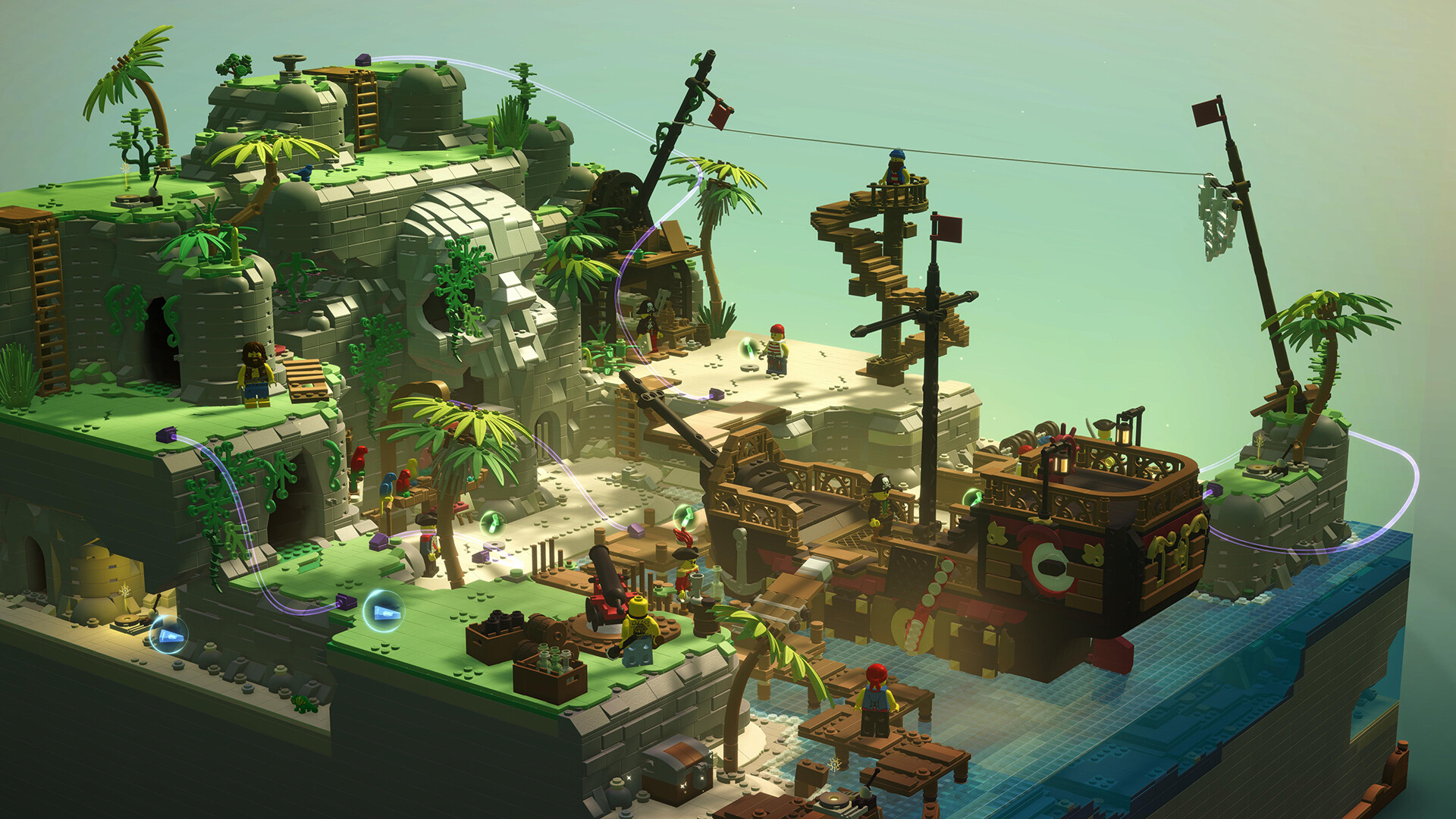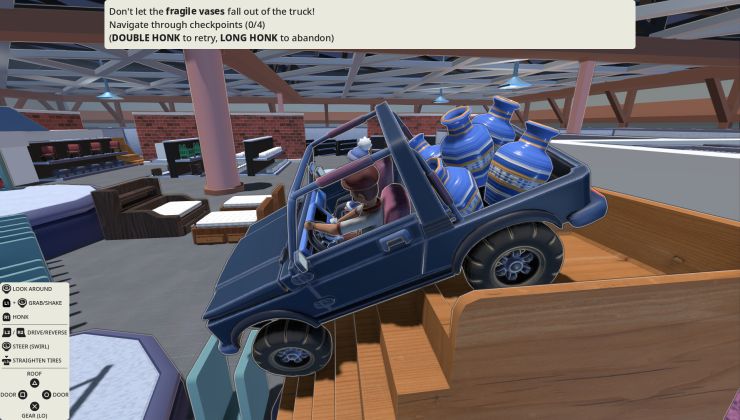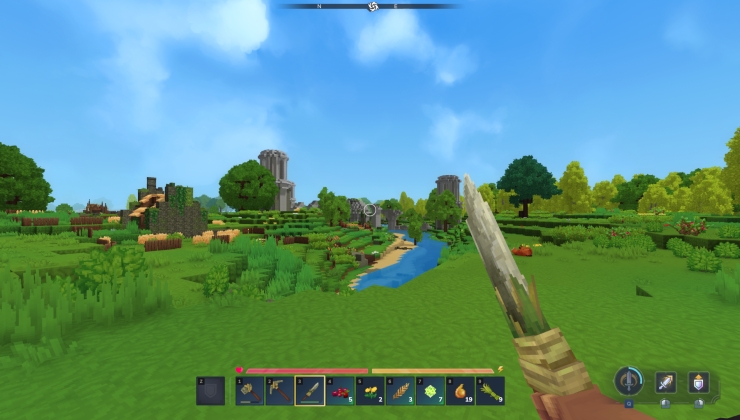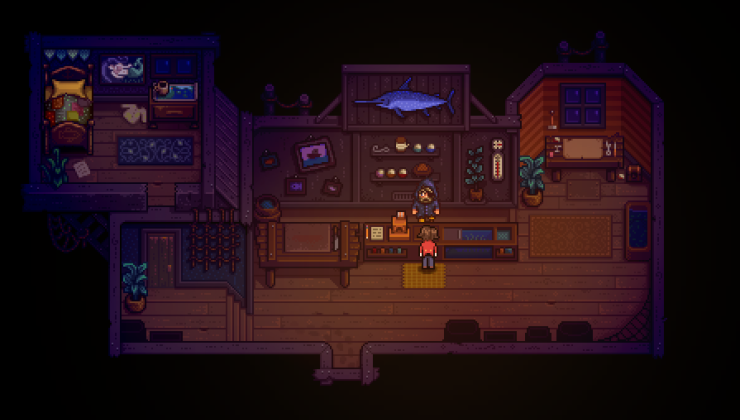Who doesn't love LEGO? ClockStone and Thunderful Publishing just recently released LEGO Bricktales and surprisingly, it came with full Native Linux support along with being Steam Deck Verified. They didn't mention anything about Linux before release, so it caught me by surprise but a welcome one and so I picked up a personal copy to give it a go.
LEGO Bricktales is set across 5 different themed biomes, where it's up to you to solve various puzzles by building anything that can help you. With physics at play, you need to ensure you're building something sound that won't fall apart.

I've actually been really quite enjoying this one. A great atmosphere, and it really does look the part — the LEGO style here is practically perfected. Having your constructions in the world, exactly as you make them is a really nice touch too, as is the ability to go back in sandbox mode and build them all bigger. While there is an overall story of helping your grandad rebuild a theme park, it's full of little mini-adventures as you go through and it's quite charming really. Good for all ages.
LEGO Bricktales is not really like any other LEGO game that has come before it. Most of them focus on some sort of action, whereas this is a stripped-down puzzle adventure from the creators of Bridge Constructor.
My only real gripe with it is that the camera controls can be a little annoying but you eventually get the hang of it.
Here's an intro and some Steam Deck footage:

Direct Link
Note: currently, the Steam Deck uses Proton by default.
Game Features:
- A globetrotting LEGO adventure: Experience a whimsical and epic adventure around the world, packed with charming dialogue and fun secrets to unravel.
- Beautiful diorama worlds: Explore five varied story world biomes and the amusement park hub, all fully built out of LEGO bricks.
- Build like never before: Discover the most intuitive brick-by-brick building in a LEGO video game, as you see your creations come to life in a three-dimensional world.
- Test your skills with varied puzzles: Different types of puzzles will test your building skills. Use your engineering brain in functional physics-based puzzles to build a bridge for a digger to get across a river, put your designer hat on to build a stunning new throne for the King, or customize the rides in the amusement park.
- Master your builds in Sandbox Mode: Unlock the Sandbox Mode upon completing a construction spot, then you go back in and improve your build with a huge selection of additional bricks from different themes.
- Heaps of items to collect and unlock: Find collectables in the different dioramas and use them to buy cool new items for your wardrobe or new brick color sets for the sandbox mode.
- Build your unique character: Create your own minifigure character from a huge selection of parts and unlock more options inspired by the worlds you visit as you progress through the story.
Quoting: LightkeyAh, Bridge Constructor (also released for Linux) developer from Germany, no surprises there. What's surprising is that LEGO/Thunderful Publishing went along with it, as it's their first Linux title. I wonder if ClockStone even mentioned it to them..Doesn't invalidate your point, but for the record, it's not Lego's first foray into Linux. To my knowledge there is at least Lego Minifigures Online that was Linux native... Unfortunately, it didn't turned out to be a success.
Quoting: LightkeyAh, Bridge Constructor (also released for Linux) developer from Germany, no surprises there. What's surprising is that LEGO/Thunderful Publishing went along with it, as it's their first Linux title. I wonder if ClockStone even mentioned it to them..Hm? I own several native Linux games from Thunderful Publishing... (but no Lego game seen yet)
glove? zink?
proton made it sustainable to grow the marketshare , and the marketshare made it commercialy viable to offer native support again.
it has been a long time since we heard an big brand natively supporting linux and i think we will start to see it again.
Quoting: elmapulglove? zink?No, if you looked at the post I linked to (you need to scroll a little bit), I just used the option -force-vulkan
Last edited by buckysrevenge on 17 Oct 2022 at 2:13 pm UTC
Quoting: elmapulwell i guess that goes to those naysayers who thought native support were more important than marketshare...Really? You're seeing an increase of native Linux games? I don't, and I sure am looking. This is just one lucky case of a development team having their Linux build and test under control and not having given up yet (unlike others).
proton made it sustainable to grow the marketshare , and the marketshare made it commercialy viable to offer native support again.
it has been a long time since we heard an big brand natively supporting linux and i think we will start to see it again.
Quoting: buckysrevengeJust to clarify, [the Steam Deck uses the Windows version by default](https://steamcommunity.com/app/1898290/discussions/1/6077070109425537643/), but there is a Linux version. I also noticed that the Linux version uses OpenGL, which causes some texture issues for me on my other systems, forcing the game to use Vulkan fixes that.An update went out today that mentions z-fighting issues are fixed. Looks fine on my desktop with the Native build.
Quoting: buckysrevengeI also noticed that the Linux version uses OpenGL, which causes some texture issues for me on my other systems, forcing the game to use Vulkan fixes that.I've got the flickering in OpenGL as well.
No update on GOG so far, so I don't know if that fixes the issue. I hope that I don't run into the other issues which have been hotfixed on Friday for the Steam version.
Edit: Actually there has been an update, but the update notifications are broken at the moment, so I missed it.
Last edited by Klaas on 17 Oct 2022 at 3:36 pm UTC
Quoting: LightkeyAh, Bridge Constructor (also released for Linux) developer from Germany, no surprises there. What's surprising is that LEGO/Thunderful Publishing went along with it, as it's their first Linux title. I wonder if ClockStone even mentioned it to them..They are actually from Austria. Since they are from my hometown I am picky about that...
Quoting: TuxeeIsn't that the same?!? ;)Quoting: LightkeyAh, Bridge Constructor (also released for Linux) developer from Germany, no surprises there. What's surprising is that LEGO/Thunderful Publishing went along with it, as it's their first Linux title. I wonder if ClockStone even mentioned it to them..They are actually from Austria. Since they are from my hometown I am picky about that...
To say something more constructive: Happy cake day!
Quoting: elmapulit has been a long time since we heard an big brand natively supporting linux and i think we will start to see it again.I find it quite interesting that we've seen both the recent Teenage Mutant Ninja Turtles: Shredder's Revenge and this one arrive with day-one native Linux support. It's not what I expect from games based on big brands, but it's certainly welcome! :smile:
Quoting: EikeReally? You're seeing an increase of native Linux games?well, i dont know, when was the last big brand announced?
i think this is just the begining, if steam deck start selling like an console, companies will care about providing an first class support for SteamOS if nothing else.
if linux had an bigger marketshare than windows, linux would be the first target instead of an after trhough, android is there to prove, and windowsphone is dead for a point.
Quoting: EikeI too have been getting the feeling that, rather to my surprise, and despite some high profile counterexamples, I'm seeing a bit more native Linux releases than before the Deck.Quoting: elmapulwell i guess that goes to those naysayers who thought native support were more important than marketshare...Really? You're seeing an increase of native Linux games? I don't, and I sure am looking. This is just one lucky case of a development team having their Linux build and test under control and not having given up yet (unlike others).
proton made it sustainable to grow the marketshare , and the marketshare made it commercialy viable to offer native support again.
it has been a long time since we heard an big brand natively supporting linux and i think we will start to see it again.
Quoting: Purple Library GuyI too have been getting the feeling that, rather to my surprise, and despite some high profile counterexamples, I'm seeing a bit more native Linux releases than before the Deck.I spent a bit of time on SteamDB checking the numbers.
Year Total Linux Proportion
2012 323 87 26.9%
2013 461 178 38.6%
2014 1,603 488 30.4%
2015 2,637 842 31.9%
2016 4,289 1,056 24.6%
2017 6,163 1,168 19.0%
2018 8,035 1,216 15.1%
2019 7,745 976 12.6%
2020 9,576 1,098 11.5%
2021 11,536 1,222 10.6%
2022 11,041 1,159 10.5%The Deck might have stopped the number going down (or that might be a natural floor for the size of market and inherent preferences of game developers) but it hasn't made it go up yet. Fingers crossed that it ultimately will, though.
Last edited by CatKiller on 18 Oct 2022 at 9:18 am UTC
Quoting: CatKillerI spent a bit of time on SteamDB checking the numbers.Very interesting. Thank you.
So the absolute number of Linux releases has been constant for many years (with the outlier 2019) - only the relative number has gone down since the absolute number or releases has increased a lot.
I expect that it is too soon to see a real change in numbers due to the Steam Deck, but at least we get more developers that try to get their games verified which should increase wine compatibility.
Quoting: CatKillerThanks for bringing numbers!Quoting: Purple Library GuyI too have been getting the feeling that, rather to my surprise, and despite some high profile counterexamples, I'm seeing a bit more native Linux releases than before the Deck.I spent a bit of time on SteamDB checking the numbers.
My little grain of salt: Sometimes, old games are ported to Linux (like Wadjet Eye's). So even with a constant rate of porting, I'd expect the numbers for years longer ago to be a bit (but not hugely) higher.













 How to setup OpenMW for modern Morrowind on Linux / SteamOS and Steam Deck
How to setup OpenMW for modern Morrowind on Linux / SteamOS and Steam Deck How to install Hollow Knight: Silksong mods on Linux, SteamOS and Steam Deck
How to install Hollow Knight: Silksong mods on Linux, SteamOS and Steam Deck